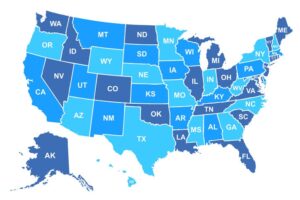Can you inherit debt? Here’s what to know

Receiving an inheritance is usually a good thing — you might receive money, property, and sentimental items that remind you of your loved one, like their favorite watch or jewelry.
But sometimes, it’s not a good thing at all. That’s because it’s possible to inherit debt after someone’s death. Below, we’ll cover everything you need to know about what kinds of debt you can and cannot inherit.
What kinds of debt can be inherited?
What happens to debt when someone dies depends on several factors, including the type of loan involved, the terms of the loan, and whether the estate can cover it.
The truth is, it’s quite difficult to inherit debt unless you cosigned it or are a primary account holder. In a perfect scenario, your loved one’s estate would cover any debts they didn’t pay off before they passed. But when the deceased person’s estate can’t cover their debts, the remaining balance often remains unpaid.
This isn’t always the case, however, and you can sometimes inherit their debt after they’ve died. Here are some of the most common types of debt you can inherit:
Cosigned debt: If you cosigned any of the loans of the deceased, then you’ll almost certainly be responsible for them. That’s because cosigning a loan specifically protects creditors in case the primary loan holder is unable to repay the loan for any reason — including death.Joint account debt: If you hold any joint accounts with the deceased that incurred any debt, such as a joint credit card account, then you’re responsible for the outstanding balance after their passing. Keep in mind that this is different from simply being an authorized user on the deceased’s credit card account, as authorized users aren’t liable for any outstanding balance on the primary account.Home equity loans on inherited houses: If your loved one took out a loan against their home, and you inherit the home, you’ll also inherit the loan. For example, if you inherit a $400,000 home with an outstanding home equity loan for $100,000, then you — and any other beneficiaries named in the will — have to assume the loan or sell the home to cover it.Debt in community property states: If you’re the surviving spouse in a marriage with community property, then you must assume any loans incurred during your marriage, regardless of whether you cosigned them. States with community property regulations are Arizona, California, Idaho, Louisiana, Nevada, New Mexico, Texas, Washington, Wisconsin, and Alaska.
What kinds of debt cannot be inherited?
There are many types of debt that cannot be inherited. For example:
Debt solely owned by the deceased person: Any debt that the deceased person was solely responsible for cannot be inherited. In other words, if they took out any loans or credit card debt without any cosigners, then that debt cannot become anyone else’s responsibility. Their bank or credit agency will write off any outstanding debt after death.Medical debt: Unless you cosigned on your loved one’s medical bills, you typically won’t be responsible for this kind of debt. Many states have filial responsibility laws that technically make it your responsibility to take care of your parents if they aren’t covered by Medicare, and if their estate can’t pay off their medical debts.
But these laws are inconsistently enforced, and if your loved one’s estate isn’t large enough to cover healthcare costs, creditors usually forgive what’s left. If you didn’t cosign any medical bills, then the only way you would likely be responsible is if you’re the surviving spouse and live in a community property state.
Federal student loan debt: Federal student loans are discharged upon the death of the student. This also includes loans with cosigners, as the federal government won’t make the cosigner pay for the student loans of a deceased student. Additionally, Federal PLUS loans are also discharged upon the death of the borrower or the borrower’s parent.Secured debt: Secured debt, such as a car loan or a mortgage, cannot be inherited if there isn’t a cosigner. However, you may be held responsible for the remaining balance of a loan if you inherited an asset that hasn’t been paid off yet and want to keep it.
For example, you must make the mortgage payments on a home you inherited and wish to own. If you cannot afford to make the payments, you may have to sell the house or rent it out to cover the monthly payments. Otherwise, the creditors may seize the security to repay the outstanding loan.
If multiple beneficiaries have a right to a portion of the home — either as stated in the will or as appointed by an administrator if there’s no will — the person who wants to keep the property can buy out the others with cash, or everyone can jointly choose to share or sell the home.
How to deal with debt when someone dies
Figuring out what to do with the finances of a loved one after their passing can be a complex process. Here are four steps to take when dealing with their debt:
1. Find out who the estate executor or administrator is
The estate executor is the person responsible for carrying out the last wishes of the deceased person. This person is appointed by name in the will and is often a spouse, parent, or child of the former owner of the estate. It could also be a lawyer or another professional closely acquainted with the person’s finances.
An administrator, on the other hand, is a person appointed by the court to distribute the estate if the deceased didn’t appoint anyone in their will — or doesn’t have one.
Your first order of business should be to find out who the administrator or executor is, as they are responsible for distributing all the assets in the estate as well as settling all the debts. If that person is you, you’ll be the one who must deal with creditors.
2. Look at the deceased’s outstanding loans
The executor should identify all of your loved one’s outstanding debts and look at the terms and conditions to identify any cosigners. They should also notify any creditors of their passing by sending a death certificate.
3. Know what to do when debt collectors call
Debt collectors may give you a call, but that doesn’t mean that you’re responsible for repaying any debt. According to the Fair Debt Collection Practices Act (FDCPA), a debt collector is only allowed to contact you to ask who the estate executor or administrator is. However, they cannot threaten you, harass you, or ask you to pay for any debts that you’re not responsible for. If a debt collector bothers you repeatedly, you may submit a complaint to the Consumer Finance Protection Bureau.
4. Consider hiring a lawyer
Finally, you should think about hiring an estate lawyer to help you deal with your loved one’s finances. While a well-executed will could resolve any outstanding debts very easily, not every estate is as straightforward. Some estates may need to settle multiple debts and go to probate court, which will require a skilled attorney.
Debt and life insurance
If you’ve inherited debt, you might think life insurance is no longer affordable, and cannot fit into your current financial picture. But term life insurance is designed to be affordable, and it can help provide financial protection for your loved ones in case you die.
For example, a 30-year-old woman in excellent health can get a 20-year, $500,000 Haven Term life insurance policy for $15.16 per month. This coverage provides a half-million dollars to your designated beneficiary if you die during the term, and this money can pay down any inherited debts, as well as go toward end-of-life expenses, food and housing, tuition and more.
These are all things your loved ones would have to pay for in the event that you die, and they would be doing so without your income to help cover these expenses. So the real question becomes not whether you can afford to get life insurance, but whether you can afford not to.



